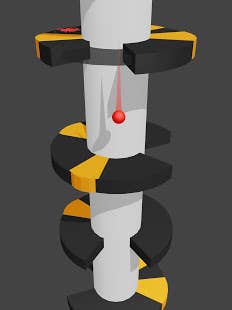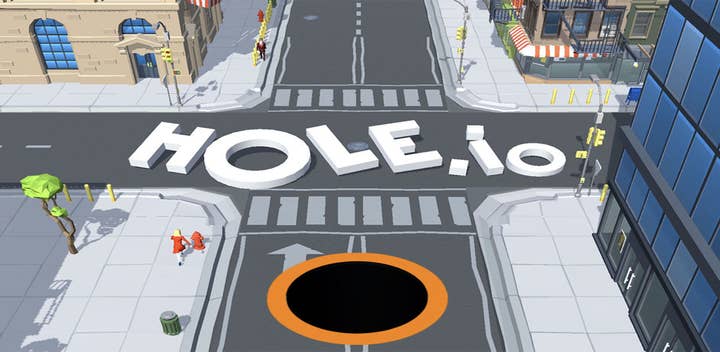The search for creativity at Voodoo's new Berlin studio
GM Alexander Willink plans to focus on small teams, fast testing, and creative people to "find the fun" in new games
As Alexander Willink puts the plans in place for Voodoo's new Berlin studio, his primary focus is on creativity.
Willink just joined the company as general manager for the new office after setting up a London studio for Gram Games. With Voodoo, however, Willink is in charge of the studio after the set-up, and is already on board with the company's production philosophy.
"I've known [Voodoo] founders Alex [Alexandre Yazdi] and Laurent [Ritter] for many years, since my time at Apple," said Willink. "What really attracted me to the way they work is their ability to give people full freedom to develop their ideas. Part of their philosophy is hiring really great people, and then giving them all the tools that they need to create games or apps or whatever it is they're going to be for Voodoo. That bottom-up approach to creation and production was what was really exciting to me.
"I've seen a number of different times where managers get heavily involved in game creation and micromanaging small teams and directing the focus for developers and artists. That really doesn't work for me. I embrace working in small teams, being as creative as possible, and testing things quickly."
"I embrace working in small teams, being as creative as possible, and testing things quickly"
"Small teams" is the key for Willink and Voodoo. Willink told me that across the company, couples or trios of developers work on new projects constantly, testing a roughly estimated 400 games per month. He plans to follow the same model, with the Berlin studio starting at around ten people. The developers will work in groups of two or three to prototype and test around one new concept per group over a one- to two-week period. Eventually, he hopes to expand to between 30 and 40 people.
Willink said that for this fast-paced cycle to work, each team has to be extremely creative. Game ideas at Voodoo aren't handed down from above; they're generated from within each team constantly.
"I really want to give people the freedom to create their own games," he said. "I know that sounds quite idealistic, and at a lot of companies that's how it's sold to somebody, similar to my experiences in the past. But with me running the studio I intend for that to be the case. I've seen small teams come up with the most creative ideas just by openly discussing them and pushing each other to the boundaries of what is currently out on the market."

The reason why Voodoo wants a new studio in Berlin isn't especially complicated. The mobile giant is already responsible for a number of popular, hyper-casual games at the top of the App Store or Google Play charts on a daily, monthly, and yearly basis, and it wants more of those games. Berlin, Willink said, is perfect for that. The city is home to a number of well-known game studios, and is full of development talent for a new studio eager to hire. But for Willink personally, there's another reason the city is attractive.
"I like the idea of being in a city that is a little bit smaller than London, and people are able to live closer to the office without having to commute for an hour and a half or whatever, so that the lifestyle of game production becomes a little bit more friendly," Willink said. "There is also access to a lot of great talent from Central Europe, from around Poland and Ukraine and Lithuania and countries like that."
Following that sentiment, I asked him how he felt about industry work conditions and the issue of game development crunch in general, since work-life balance already seemed to be on the forefront of his mind as he formed this new studio. Willink replied that he's seen first-hand that stress "has a detrimental effect" on creativity, but feels crunch can be justifiable if it's "self-motivated."
"I want people to have ownership of what they're creating, and if they really feel like they need to push something out in a certain amount of time because they're passionate about it, I want to give them the resources and ability to do that," he said. "But at the same time, I don't want to have an environment where people are stressed or worried that they have to get a certain amount of things out in a certain time, or finish a sprint in a certain period, or anything like that.
"I like the idea of being in a city that is a little bit smaller...so that the lifestyle of game production becomes a little bit more friendly"
"I think that hinders the creative mind. These very small games can evolve very quickly, and if there is a very strict process in place in order to get a game out in a certain amount of time, I think that would actually limit the ability for that game to evolve."
While the Berlin studio will take on the same direction as the rest of Voodoo to start, Willink is open to experimentation once things are in full swing. That includes, Willink hinted, being open to expanding beyond the company's hyper-casual label (though he emphasized he was making no promises to that effect).
"We at the Berlin studio will evolve our direction over time," he said. "I'm very keen for it to be dynamic and for the whole team to be involved in deciding which directions we should take. I'm open to different types of games, themes, genres, anything. But at the beginning at least, for the first six months I'd like to stick in the hyper-casual market, just because that's where a lot of my experience lies and I enjoy the rapid prototyping process.
"I am very open to multiple different types of games. Voodoo has a very impressive user acquisition team that are able to push games right to the top of the charts, and I think that's a skill that can be leveraged for many different types of games. Stay tuned on that one, but I'm excited to potentially explore some new things as well."

One of the bigger issues faced by mobile game developers is the saturation of both the App Store and Google Play with games that are outright clones of existing games, as well as tons of games with similar concepts or genres. Willink said that neither he nor Voodoo is concerned either about clones of Voodoo's games or the saturation of certain genres. Rather, Voodoo wants to make games that become the hits everyone else makes clones of.
"What we call 'unicorns', which are game-changing games, are games like Helix Jump, Hole.io, 2048, and Flappy Bird," he said. "These are really iconic games that have dramatically impacted the casual market, and those games usually come from a creative background. Not necessarily something completely groundbreaking, but definitely coming from a more inspirational and creative space than a copy and iterate space.
"Just focusing on small iterations and changing what's already out there I don't think is the way to find profitable games"
"What we usually see is one of the unicorns like Hole or Helix hit the store, and then there is a series of clones that happen even one-to-two weeks afterwards. They all ride the wave, but they typically don't perform all that well. Typically the cost-per-install is quite high because the original game has already launched. Therefore, the profitability on those games is quite low.
"What we're doing to avoid that is focus purely on unicorns... That's the way that we're able to stay ahead of the competition. Just focusing on small iterations and changing what's already out there I don't think is the way to find profitable games."
I pointed out that it was interesting he brought up Hole.io as a unicorn. In July, developer Ben Esposito pointed out on Twitter that Hole.io appeared to be a "cheap clone" of his game, Donut County. Donut County hadn't been released at the time, but Esposito said that Hole.io combined the premise and visuals of his upcoming title with the "king of the hill" .io format.
Willink wasn't working at Voodoo when this happened and he wasn't involved with Hole.io, so he wasn't able to comment on the specific incident. However, he did speak to how Voodoo broadly handles these similarities.
"The team at Voodoo is constantly looking at the market for ideas and inspiration," he said. "There are many games that are very similar to proven mechanics that then take them a little bit further and are able to identify the fun element a little bit better than the original. As an example, Threes was the original inspiration for 2048 and that was developed for a couple of years by two guys to get the game out, but obviously it was nowhere near as successful as 2048.
"It's easy to look at an original concept of an idea and say it doesn't work and it was copied, but if it was taken to the next level and something was changed about it to make it really fun? I think that's usually how the creative process works. Blending a bunch of different ideas together and finding something that really just fits. It's often hard to identify exactly what that is, but that fun element, that feeling when you play a game where it just feels so natural, is not always easy to get the first time you come up with an idea."





.jpg?width=291&height=164&fit=crop&quality=80&format=jpg&auto=webp)


